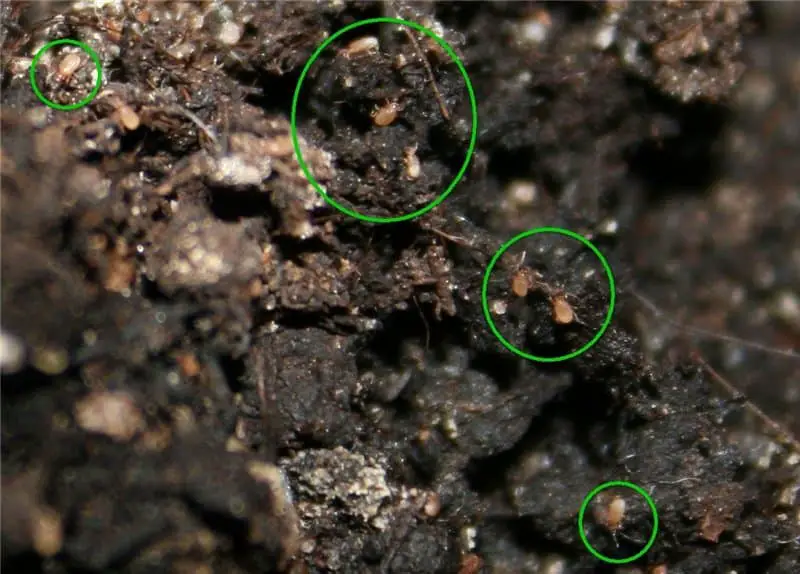
So you’ve encountered a problem that’s all too familiar for myself, you have discovered some small, fast bugs in your soil, now what?
Well, first of all, don’t panic.
Most likely they are harmless, in fact, they’re probably beneficial to your plant.
But if you’re an indoor gardener like me, then you’re probably not going to want to keep them around.
There are a few different types of bugs that are often found in indoor house plants but first, and I tend to find them on my indoor hydroponic gardens quite often. But in order to take action, we need to identify exactly what they are.
Table of Contents
Identifying Common Houseplant Bugs
It’s pretty easy to mistake one bug for another, especially considering their size, so having a magnifying glass with LEDs, like this one on Amazon can really help with the identification process.
With our help, we hope to give you the best chance of correctly identifying them so you can take the appropriate action.
Does it jump? – Springtails

Springtails get the name from their tail, they use it as a method of escape by jumping high into the air when they are startled.
This is the easiest way to identify them!
They are actually harmless to your plants as they feed off dead, organic matter.
Many people even say they are beneficial.
Is it furry? – Mealybugs

The bug itself is white, but it also secretes a cotton-like substance that helps them retain moisture and to regulate their temperature.
It’s known as “Honeydew” and is actually made from excess sugars.
In large numbers, these can be detrimental to your plant.
Common signs of an infestation is limp plants with stunted growth.
Does it look like a spider? – Spider Mites

These are notoriously difficult to identify due to their size, you will need a magnifying glass to help you.
They have 8 legs and a pale white body that can sometimes look brown.
Large infestations will cause damage to your leaves, you will begin to see small, dark dots appearing.
Quick Fact
Spider mites are not actually classed as true insects, they are arachnids – a close relation to typical spiders!
Is it long and thin? – Thrips

Thrips start off a creamy yellow/pale colour but as they mature, they become black/brown.
They feed off plants by puncturing holes and sucking the juices from the inside.
You can identify a thrift problem by your leaves going a dull green with black droppings on them.
Also, a silvery colouration will appear on the leaves after persistent damage.
Is it winged? – Whitefly

Whiteflies are easily identified, just look for a bright, white, triangular-shaped, winged bug.
You can often find them in a cluster on the underside of your leaves.
The second you begin to spray your plant, these will fly away and simply return when you’ve finished.
They’re one of the more annoying bugs to remove, and to do so you must target the young.
Close Cousin
I bet you didn’t know that this winged insect is actually a close relation to the mealybug!
Removing Bugs From Your Plants
First of all, it’s best that you check on the health of your plant first, if you find that it’s doing pretty well then you should consider letting the bugs stay.
But if you can’t stand the sight of them and really want them gone then there are a couple of quick methods you can follow to solve the problem.
Neem Oil
This is one of the best and most natural methods. It’s very common among organic growers and it’s pretty easy to get your hands on.
It’s safe, pesticide-free, whilst also being one of the most effective at keeping pests away.
I personally recommend getting this great value organic concentrate as it has has worked wonders for me so far.
Pesticides
Often, pesticides are the easiest route to go down as they are designed with bug removal in mind.
However, as you’re most likely to be indoors, you want to use a natural one like this one on Amazon.
You should always read the label of products you use to ensure they are safe to use inside.
Ensure that you keep the windows open for a few hours after spraying to allow air to flow through your home.
Replanting
This is a quick and safe option, no chemicals involved. You will need to be careful doing it this way as you need to fully expose your plants’ roots and wash away all the soil/bugs.
Once you’ve done this, carefully re-home it into a fresh pot of soil and monitor it over the coming weeks.
Spray Water
With some bugs, spider mites especially, you can simply spray them off with water.
A fine mist spray bottle like this one will suffice, don’t be using anything too powerful as it will damage the leaves on your plant.
There are some bugs that this will not be effective for, such as Whiteflies as they will just return when you’ve finished, it’s like you’re cleaning their home!
Monitor your infestation
If you plan on leaving the bugs there, ensure that you regularly check up on them to ensure the population isn’t getting out of control.
Too often people end up with their homes covered in pests and end up resorting to a pest removal service to get them out of the damp areas.
Quick Bug Prevention Tips
There’s plenty you can do to help prevent an invasion, one of the most effective methods is a regular cleaning routine for your houseplants.
Check out the video below for a great home plant cleaning routine that you can easily do.
Summary of White Bugs on Plants
Below is a table summarising the types of white bugs which appear on houseplants.
| Question | Bug Type | Description/Notes |
|---|---|---|
| Does it jump? | Springtails | – Named for their tail which they use to jump when startled. – Harmless; feeds on dead organic matter. Beneficial to plants. |
| Is it furry? | Mealybugs | – White bug with a cotton-like secretion called “Honeydew” made from excess sugars. – Harmful in large numbers. |
| Does it look like a spider? | Spider Mites | – 8 legs, pale white body. – Causes damage to leaves. – Not true insects; they are arachnids. |
| Is it long and thin? | Thrips | – Creamy yellow/pale initially, turn black/brown as they mature. – Feed off plants by puncturing holes and sucking juices. |
| Is it winged? | Whitefly | – Bright, white, triangular-shaped, winged bug. – Found clustered on the underside of leaves. Related to mealybugs. |
To combat the above white bugs it is recommended that the following remedies be investigated further.
| Feature | Remedy | Description |
|---|---|---|
| Bug Removal Methods | Neem Oil | – Natural, organic, pesticide-free. |
| Pesticides | – Effective but should use natural variants for indoor plants. | |
| Replanting | – Expose plant roots, wash away soil/bugs, and replant in fresh soil. | |
| Spray Water | – Effective for some bugs like spider mites. Not effective for Whiteflies. | |
| Bug Prevention Tips | Regular Cleaning | – One of the most effective methods to prevent bugs is a regular cleaning routine for houseplants. |

Do Mealybugs Live In Soil? – Bescord
Friday 27th of May 2022
[…] So you've encountered a problem that's all too familiar for myself, you have discovered some small, fast bugs in your soil, now what? Well, first of all, don't panic. Most likely they are harmless, in fact, they're probably beneficial to your plant. via […]
What Do Root Aphids Look Like – Bescord
Friday 27th of May 2022
[…] So you've encountered a problem that's all too familiar for myself, you have discovered some small, fast bugs in your soil, now what? Well, first of all, don't panic. Most likely they are harmless, in fact, they're probably beneficial to your plant. via […]
How To Get Rid Of Bugs In Peace Lily – Bescord
Friday 27th of May 2022
[…] So you've encountered a problem that's all too familiar for myself, you have discovered some small, fast bugs in your soil, now what? Well, first of all, don't panic. Most likely they are harmless, in fact, they're probably beneficial to your plant. via […]
Top 10 what are tiny white bugs on plants – hkfindall.com
Tuesday 5th of April 2022
[…] Quote from the source: … […]
Do Compost Piles Attract Roaches? – Erickkasysavane
Sunday 5th of December 2021
[…] So you've encountered a problem that's all too familiar for myself, you have discovered some small, fast bugs in your soil, now what? Well, first of all, don't panic. Most likely they are harmless, in fact, they're probably beneficial to your plant. via […]